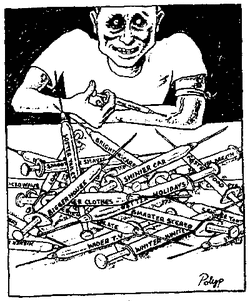While perusing Netflix a few nights ago, I stumbled across an indie film entitled, "The Queen of Versailles." Weighing in at 1 hr and 40 minutes, this 2012 award-winning documentary really packed a punch.
The film depicts (then) 70-year-old billionaire David Siegel, the Founder and CEO of a large time share empire, and his 42-year-old-former-Mrs.-Florida-wife, Jackie. Together, with their fleet of children, pets, drivers, housekeepers, and nannies, the couple endeavors to build the country's largest residential dwelling. Modeled after its namesake, the 90,000- square-foot home (pictured below), boasts its own bowling alley, several indoor swimming pools, ten kitchens, multiple bedrooms and bathrooms, and even a 5000-square-foot closet.
the lavish parties, private jets, private schools, etc.--came to a screeching halt. Construction on Versailles ceased and the family's flagship home sailed into foreclosure.
A few years after the film debuted, the economy recovered. Siegel was able to salvage the remnants of both his business and his mansion (Versailles is reportedly due to be completed this year). He could not, however, save his 18-year-old daughter, Victoria, who succumbed to a heroin overdose in her parents' home on June 6, 2015. The film was popular, not only because it offered us a peek into the lives of the very wealthy (about which many are naturally curious), but because it examines why, swathed in abundance, so many of us are compelled to seek more. People tend to assume they should feel happy most or all of the time. So, when we experience normal dark emotions, like boredom, sadness, shame, longing, or loneliness, we believe them to be an indication of our deficiency. Into the void we shovel substances, work, people, money, sex, material objects, etc. hoping they will provide us relief. We may even feel better for a little while. But novelty's "high" eventually wears off and, when it does, we seek to recapture it with bigger, better, and more. The wise part of us knows that seeking validation in external things is a fool's errand. But that doesn't stop us from trying. Many of us would rather chew off our arms than sit, even for a moment, with boredom, sadness, shame, longing, or loneliness. People often consult me because they are plagued by too much of something: depression, food consumption, substance abuse, work, etc. What they are often surprised to find is that overindulgence in one area is a signpost for perceived scarcity in another. For example, depression is not the result of too much sadness, it is what happens when we do not trust ourselves to fully experience sadness (without allowing it to consume our lives). The harder we work to suppress dark emotions, the more prominent they become. Filling the void with external things only reinforces that there is something to escape. We all posses a void, the size and shape of which is contingent upon our life experiences. Seeing the void for what it is--a bout of temporary dark feelings--tips us gently toward the light. If you are currently grappling with the void, here are four things to remember: 1. Beauty: In dark times, it is easy to forget that beauty exists. But it does. Everywhere. Need a reminder? Go outside and find something that occurs in the natural world. Study it closely. Take it in with as many senses as you can. You'll be amazed. 2. Gratitude: Make a daily list of at least three things for which you are grateful. The simpler, the better. It sounds corny but it really helps. Why? Think of Gratitude and Joy as your two favorite aunties who live in a duplex with an adjoining door. When you visit one, it is highly likely you will run into the other. Gratitude reminds us we are capable of joy. 3. Worthiness: Though we may feel least deserving of love in our lowest moments, it is then we most need it. We all possess a groundswell of love inside of us. You may not recognize yours right now, but it's there. You can--you will--access it. It's okay if you don't know how to do this. According to Melody Beatty, "H.O.W." stands for "Honesty, Openness, and the Willingness to try." With these three things on board, you're all set. The rest will figure itself out. 4. Acceptance: Try to accept that you will never find satisfaction in bigger, better, or more because they do not address the source of your hunger. Most of us simply long to know that we are okay. We are always okay, in the absence of external validation, even when we don't feel okay. I am often asked by people how long they will be in pain. Typically, my answer is "as long as." We cannot schedule an end date for our feelings. We can simply set a conscious intention to love ourselves through them. The void may never fully go away. This not an indication of deficiency; it is a byproduct of living. We are all doing our best to manage the void as it comes. Replacing the quest for bigger, better, or more with our own patience and love, over time, helps it diminish. If managing the void on your own is no longer working, it could be time to email me for a free consultation. Life can get pretty tough--you don't have to do it alone!
Dr. Jill Gross is a licensed psychologist, dating coach, and writer. She offers dating consultation and counseling services in Seattle, WA.
Sign up for great monthly personal growth-related content here:
0 Comments
Your comment will be posted after it is approved.
Leave a Reply. |
AuthorDr. Jill Gross is a licensed psychologist, specializing in grief and divorce. Her coaching and therapy practice is located in the Phinney - Greenwood area of North Seattle in Washington. Archives
May 2021
Categories
All
|
HoursM-TH: 8:30 AM - 2:00 PM.
By Appointment Only |
Telephone & Email |
Address503 N. 50th Street
Seattle, WA 98103 |
*Header Photographs courtesy of Josh Martin



